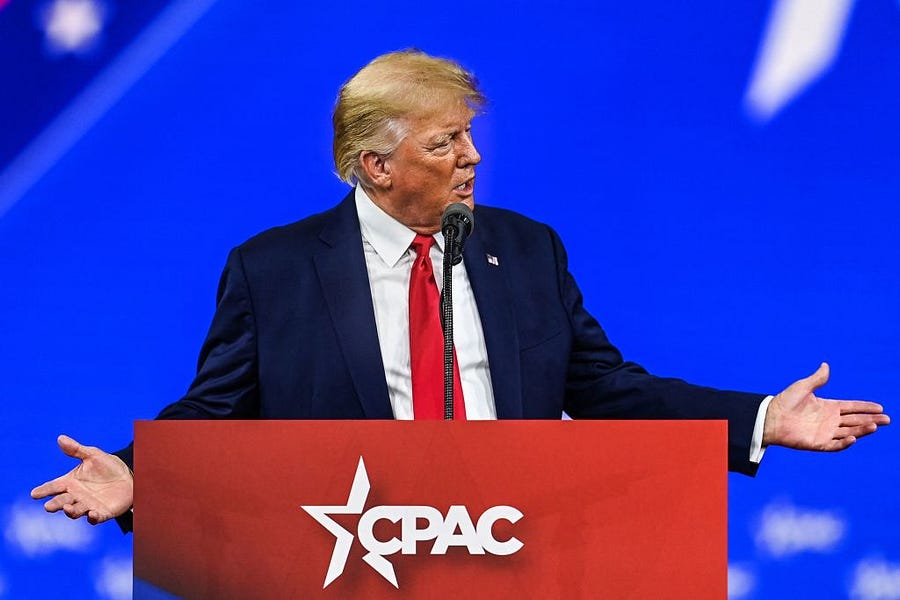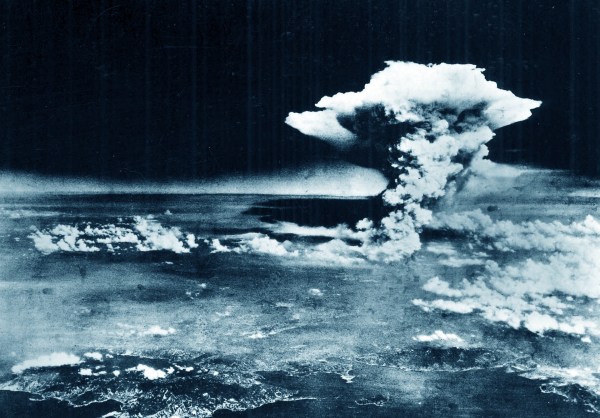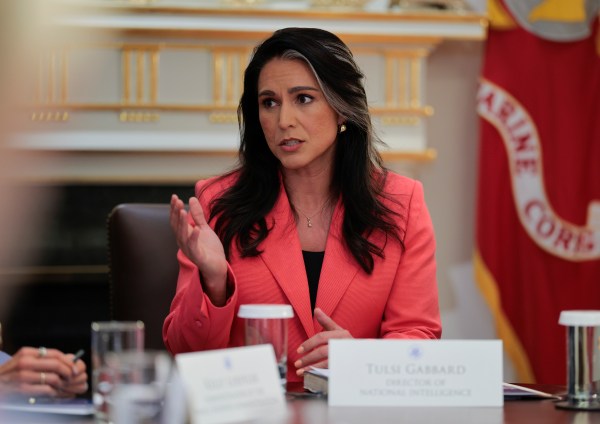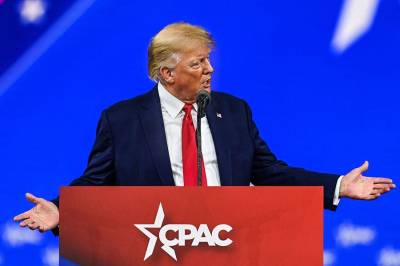Speaking in the primetime slot Saturday night at the Conservative Political Action Conference in Orlando, Florida, former President Donald Trump had a few things to say about Vladimir Putin’s territorial war against Ukraine. One, the “Russian attack on Ukraine is appalling. It’s an outrage and an atrocity that should never have been allowed to occur.” Two, both the Ukrainian people and their president, Volodymyr Zelensky, are “brave” and deserve our prayers. And three, “As everyone understands, this horrific event would not have happened if there wasn’t a rigged election and I was president.”
Throughout his speech, Trump indulged in the simple pleasures afforded to those who aren’t in power during a crisis, confidently asserting throughout that it was only due to President Joe Biden’s weakness on the world stage that Putin felt comfortable invading Ukraine at all. For much of the speech, indeed, Trump seemed to be doing his best impression of a neoconservative hawk, scoffing at the notion that economic pressure alone could rein Putin in:
The NATO nations, and indeed the world, as [Putin] looks over what’s happening strategically with no repercussions or threats whatsoever—they’re not so smart. They’re looking the opposite of smart. “If you take over Ukraine, we’re going to sanction you,” they say. Sanction? Well, that’s a pretty weak statement. Putin is saying, “Oh, they’re going to sanction me? They sanctioned me for the last 25 years! You mean I can take over a whole country and they’re going to sanction me? You mean they’re not going to blow us to pieces—at least psychologically?” … And they’ve so far allowed him to get away with this travesty and assault on humanity.
Trump interwove much of his commentary on Ukraine with other old grievances.There was, of course, much rehearsing of the false claim that his defeat at Biden’s hands in 2020 was due to foul play. In praising Zelensky, Trump didn’t dwell on the Ukrainian president’s remarkable courage in staying and fighting alongside his people at great personal risk, rejecting a U.S. offer of evacuation. Instead, Trump wanted to discuss how Zelensky helped him score a point on Rep. Adam Schiff during his first impeachment, when he was accused of withholding aid to Ukraine until the country announced a criminal investigation into Joe Biden:
Adam shifty Schiff. Where do you meet people like this? He actually made up a story about my phone call with the president of Ukraine—who by the way is a brave man, he’s hanging in. He’s a brave man. And I like him because, you know, during that ridiculous impeachment waste of time, and the Republicans stood by us we were 196-0, when did you ever hear Republicans do that? But this was truly a scam. But the president of Ukraine said, he did nothing wrong. He could’ve said he did something, or he thought, oh, it wasn’t appropriate—all the crap you have to listen to, right? He said, he did absolutely nothing—I called him up to congratulate him on his victory. He said he did nothing wrong, absolutely nothing wrong. I’m glad that tape was going, those transcribers were writing during that call, because otherwise it could have been—but this is what we’re dealing with. We’re dealing with some people that are truly evil. Truly bad people.
Most remarkably, Trump made the case that Russia had been emboldened to attack Ukraine by Biden’s “pathetic withdrawal from Afghanistan”—setting aside the fact that it was Trump himself, citing America’s need to wrap up its “endless wars” abroad, who planned and executed the early stages of the Afghanistan withdrawal. In fact, at another point in the speech, Trump wanted credit for this too: “So many people in the Democrat Party and the debates said, ‘He’s gonna get us into the third world war.’ I’m the one that didn’t have any wars. I’m the one that got us out of wars!”
It's easy to laugh at Trump’s attempt to have his foreign policy cake and eat it too—rhetoric of peace through deterrence and deterrence through hegemonic strength on the one hand, rhetoric about ending endless wars and no longer being the world’s policeman on the other.
But it’s also easy to see why Trump would want to lay claim to both positions at CPAC—where the situation in Ukraine and how Americans should view it has been the grounds for rare substantial disagreement among speakers.
Like Trump, of course, the speakers have been of one accord that, as with nearly every other problem facing the country today, the situation in Ukraine is Joe Biden’s fault. (This is CPAC, after all.) Beyond that, however, two opposing factions emerged.
One faction’s arguments—about Ukraine’s right to self-determination and Russia’s assault on it as just one piece in a larger attempt to undermine a U.S.-led free global order—called to mind the onetime foreign policy consensus on the right that has come under strain in recent years. “These are people who are basically saying we refuse to be Putin’s slaves,” Sen. Marco Rubio said in a Friday morning speech. “We refuse to live under tyranny. We’re prepared to give our life and die for it.”
Talk show host Mark Levin, who spoke Saturday, was more pointed.
We don’t pretend that when freedom-loving people are being crushed and slaughtered by an enemy of the United States, it doesn’t matter. It matters. … That doesn’t mean we send American troops willy-nilly into these areas, but it also doesn’t mean you sit on your hands and pretend nothing’s going on. These people want to live and they want to fight. They should have arms to kill as many of these bastards as they possibly can. And I don’t want to hear because our border’s open, our border’s open because of the fool in the Oval Office, that that means we shouldn’t care about Ukraine’s sovereignty. How about we care about our sovereignty and their sovereignty?
That last line was a direct, if not explicit, attack on CPAC’s other faction: the odd assortment of libertarians and would-be new-right thought leaders who argue that we simply can’t afford to care about what’s going on on the other side of the world when there’s so many domestic problems to address. Turning Point USA’s Charlie Kirk, for instance, spoke Thursday: “The U.S. southern border matters a lot more than the Ukrainian border. I’m more worried about how the cartels are deliberately trying to infiltrate our country than a dispute 5,000 miles away in cities we can’t pronounce, in places most Americans can’t find on a map.”
This faction also includes Ohio Senate candidate J.D. Vance, who days ago raised eyebrows by saying on Steve Bannon’s podcast that “I gotta be honest with you, I don’t really care what happens to Ukraine one way or another.” He later walked those comments back, calling Russia’s invasion a “tragedy.” But in his CPAC speech Saturday, Vance echoed Kirk: “We have a leadership in this country that is constantly focused on stuff that has nothing to do with citizens in our country, has nothing to do with serving the middle-class citizens of my state of Ohio, or all across this country.”
Meanwhile, Florida congressman Matt Gaetz scoffed at the notion that the U.S. should even support Ukraine financially: “Joe Biden and even some who have taken this stage tell us that defending freedom in Ukraine has costs for Americans … What about freedom here in this country? What about our leaders actually standing up for freedom and liberty in America? Why should Americans have to pay the costs of freedom elsewhere when our own leaders don’t even stand up for our freedom here?”
This policy fight isn’t going away anytime soon, and if Trump ever takes power again he’ll once again need to learn how to navigate these factions. For now, though, he seems content giving both sides the soundbites they want to hear.






Please note that we at The Dispatch hold ourselves, our work, and our commenters to a higher standard than other places on the internet. We welcome comments that foster genuine debate or discussion—including comments critical of us or our work—but responses that include ad hominem attacks on fellow Dispatch members or are intended to stoke fear and anger may be moderated.
With your membership, you only have the ability to comment on The Morning Dispatch articles. Consider upgrading to join the conversation everywhere.